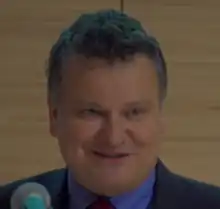Thomas Henzinger
Thomas Henzinger (born 1962) is an Austrian computer scientist, researcher, and former president of the Institute of Science and Technology, Austria.
Thomas Henzinger | |
|---|---|
 Henzinger in 2016 | |
| Born | |
| Nationality | Austrian |
| Known for | design and verification of software, hardware, and embedded systems |
| Awards | NAS Member (2020) IEEE Fellow Member, Academy of Sciences Leopoldina Member, Austrian Academy of Sciences Member, Academia Europaea |
| Scientific career | |
| Fields | computer science |
| Institutions | Institute of Science and Technology, Austria |
Early life and education
Henzinger was born in Austria. He received his bachelor's degree in computer science from Johannes Kepler University Linz, and his PhD from Stanford University in 1991,[1] advised by Zohar Manna. He is married to Monika Henzinger and has three children.
Career
Henzinger was successively Assistant Professor of Computer Science at Cornell University (1992–95) and Assistant Professor (1996–97), Associate Professor (1997–98), Professor (1998–2004) and Adjunct Professor (till 2011)[2] of Electrical Engineering and Computer Sciences at the University of California, Berkeley. He was also director of the Max Planck Institute of Computer Science in Saarbrücken, Germany in 1999 and Professor of Computer and Communication Sciences at EPFL (the Swiss Federal Institute of Technology in Lausanne), Switzerland from 2004 to 2009.[3] Until 2022, he was president of the Institute of Science and Technology Austria (ISTA).[1]
His research is concerned with modern systems theory, particularly on the models, algorithms, and tools for the design and verification of reliable software, hardware, and embedded systems. His HyTech tool was the first model checker for mixed discrete-continuous systems.[3]
He is a member of Academy of Sciences Leopoldina, Austrian Academy of Sciences, Academia Europaea, and Institute of Electrical and Electronics Engineers.
Other activities
- European Research Council (ERC), Member of the Scientific Council (since 2023)[4]
Recognition
Henzinger was awarded the 2015 Milner Award by the Royal Society.[3] He received a Doctor honoris causa from the Masaryk University as well as the Wittgenstein Prize of the Austrian Science Fund. He is an ACM Fellow and an ISI Highly Cited Researcher in 2001. He is ranked as the number one cited researcher in Austria[5] according to h-index data.[6]
References
- Kaplan, Karan (4 February 2009). "Thomas Henzinger, president, Institute of Science and Technology Austria, Klosterneuburg, Austria". Nature. 457 (7230): 752. doi:10.1038/nj7230-752a.
- "Thomas A. Henzinger, Adjunct Professor, EECS, University of California Berkeley, USA".
- "Royal Society Milner Award". Royal Society. Retrieved 19 November 2015.
- Commission appoints distinguished scientists and scholars as members of the European Research Council’s governing body European Commission, Directorate-General for Research and Innovation, press release of 7 December 2022.
- "Thomas Henzinger profile". Guide 2 Research. Retrieved 13 September 2018.
- Thomas Henzinger publications indexed by Google Scholar
External links
- Archive of the page at EPFL
- Home Page at the Berkeley EECS Department
- Page at ISTA
- Page at the Austrian Academy of Sciences
- Thomas Henzinger at the Mathematics Genealogy Project